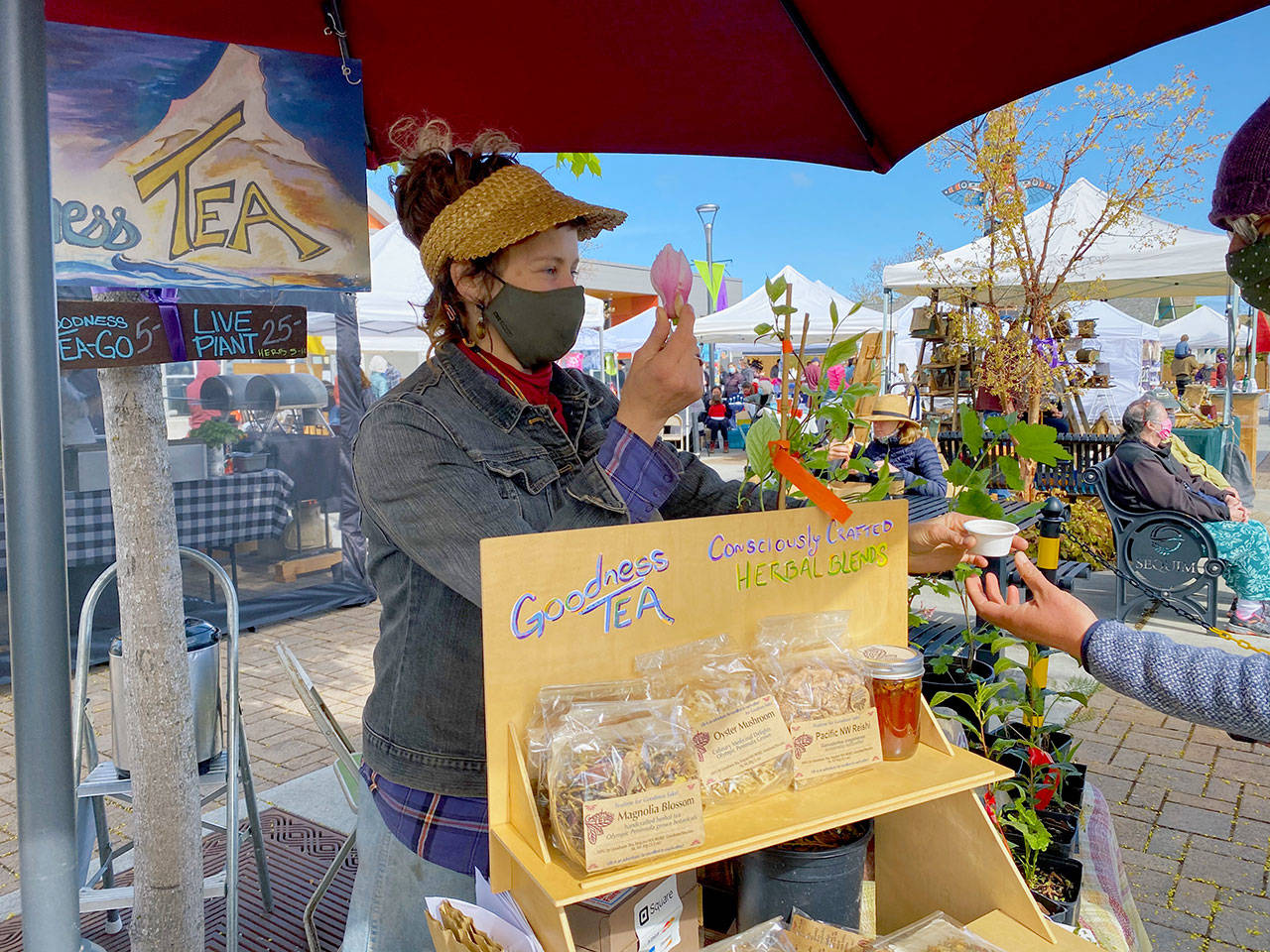Early on Saturday mornings, Shaelee Evans can be found rising early, turning a tea kettle on and preparing a cup of Matcha Meowler, a green tea matcha powder of their own blending, infused with revitalizing herbs and botanicals.
While walking through their land, Evans harvests wild herbs to add to their morning brew and begins to finalize the checklist for their booth at the Sequim Farmers and Artisans Market.
Goodness Tea is a farm and tea blending operation in Sequim. Market guests know Goodness Tea for their line of tea blends, plant based snacks, herbal honeys and vinegar and chocolate, along with live tea and botanical plants.
Years ago, Evans was approached by local community member Harvey Kailin, about the potential of collaborating and farming on his land. With this opportunity, Evans began learning from the land, and working from the established commercial kitchen on the property.
Over time, Evans has cleared out more room for production, upgraded equipment, and even made the Goodness Tea kitchen accessible to other producers. “
It’s a strong value of ours to share our facilities to help other producers get out there,” Evans said.
The tea blends of Goodness Tea can be broken down into two categories: Herbal, locally-grown-and-foraged teas and traditional teas with a unique northwest spin. Traditional tea drinkers will find the black tea based Northern Breakfast Blend to be the perfect local alternative to their morning beverage, but will be intrigued by the addition of locally foraged douglas fir tips.
Local plant aficionados will appreciate the seasonal blends that highlight what’s fresh and currently springing forth from the land.
“Early this season, I’ll be bringing local magnolia blossom tea to the market,” Evans said. “It has a soft and nuanced taste, like ginger.”
All of Evans’ blends are hand-grown, hand-harvested, or sourced from fair trade networks.
Oftentimes tea drinkers know their tea to be packed away in a tiny tea bag, with no glimpse of the bright and colorful qualities that create the flavor.
“We can be so disconnected from what we’re drinking,” Evans said. “That’s why I love offering loose leaf tea. You’re like, ‘Wait a minute, this is rosebud! This is juniper berry! I wonder what this is?! There’s an inquiry, a joy.”
Saturday market as Sequim City Hall Plaza is Evans’ element.
“As I show up to market and I unload all of my things, I’m so happy to be in this community. I look around me and there’s all these people with hearts aglow for their projects,” Evans said.
“I feel held by this community of growers, makers and craftspeople. It’s very collaborative, but we all have our autonomy and we have the structure of the market to support us.”
The continuance and growth of the market is a community necessity, Evans said.
“Having care and concern for your neighbors and their businesses is really powerful,” they said.
“Going to the market and buying your goods from local producers is ensuring these goods continue to be available locally. We cannot assume that our community is going to be raising the things we need to survive if we’re not purchasing them.
“By prioritizing shopping from a local producer, you’re directly asking them to get calves next spring, or plant those certain seeds. If we, as consumers, don’t let makers and growers know that we need them, these resources will not continue.”
Said Evans, “Markets are an integral part of keeping a community resilient in the face of adversity. We go beyond this sort of cold experience of just ‘getting something off of the shelf’ to this warm experience of actually knowing the person in direct relation to their product.”
So what could be said to those who are “community market curious” but don’t know how to integrate the market into their weekly shopping rituals? Evans suggested, “Try going to the market weekly and committing just twenty dollars to your local vendors. It’s a simple way to show your belief in this community.”
As Sequim pivots its food and gift dollars towards local vendors and businesses, a network is created that keeps the community’s unique culture intact, one that ensures a viable future for all of our neighbors and their businesses.
“The market is like an informal team of people,” Evans said. “It’s made up of those who create the market but also those who support the market. We’re all there because we love it.”
“When I first started, I was so welcomed. Hope and opportunity was given to me by the market community,” Evans noted. “Here I am six years later and I have my farm, my teas, and have expanded into so many small stores. It’s so much more beautiful than I dreamed of and it’s all because of the market. Every time I show up, I remember that.”
“It makes me so happy to remember where I’ve been,” Evans said. “While I don’t know where I’m going next, I know that the farmers market community will be a part of it. I’m always going to be encouraged by the creativity, resiliency, and beauty of the farmers and artists that surround me.”
Learn more about Goodness Tea at goodnesstea.com.
Coming up
The Sequim Farmers & Artisans Market runs 9 a.m.-3 p.m. each Saturday through Oct. 30. Visit your community market at Sequim City Hall Plaza, at North Sequim Avenue and West Cedar Street, as well as Centennial Place at the Sequim Avenue/Washington Street intersection.
This upcoming Saturday, May 8, SFAM is thrilled to partner with the 2021 Irrigation Festival to host a petite, in-person Innovative Arts and Crafts Fair. Swing by your usual market site to enjoy a scaled-down, but still exceptional, display of innovative artists and crafters.
To stay up to date with current SFAM vendors, programming news, and other market developments, be sure to follow SFAM on Instagram, Facebook and be sure to check out sequimmarket.com.
Emma Jane “EJ” Garcia is the Market Manager for the Sequim Farmers & Artisans Market.



